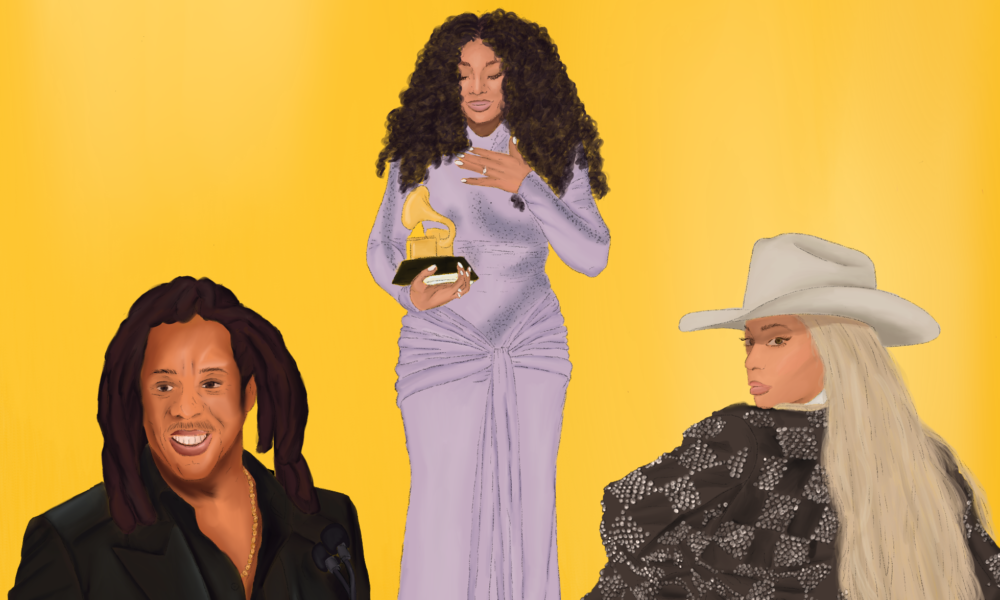Every year, the Grammy Awards accompany the periodic discussion around their failure to celebrate Black artists, and this year is no exception. Jay-Z’s acceptance speech for the Dr. Dre Global Impact Award called out this disappointing pattern in the Grammys. He noted how, despite Beyoncé being the most awarded artist in the Grammys’ history with 32 awards, she has consistently been snubbed for what is arguably the most prestigious and coveted award: Album of the Year (AOTY).
Throughout Beyoncé’s solo career, she has been nominated for AOTY four times. Most recently, she was nominated for Renaissance at last year’s awards, which lost to Harry Styles’ Harry’s House. Renaissance was by far the most deserving album, and arguably one of Beyoncé’s best albums to date. It served as a stunning homage to club culture that Black women and queer, trans-Black, Latinx people created as a safe place. In 2016, Beyoncé was also snubbed in this category when Lemonade lost to Adele’s 25. Adele spent most of her acceptance speech saying how she felt that Beyoncé deserved to win and remarking on the album’s important message of empowering Black women. Lemonade was more than just great music—it uplifted a marginalized and oppressed community.
However, the message of Jay-Z’s speech extends beyond Beyoncé. It highlights how the Grammys have continuously refused to celebrate Black excellence in the major categories: Song, Record, and AOTY. Altogether, only 11 Black artists have won AOTY, with only four of those awarded in the past 20 years. It has been 25 years since a Black woman won the award, with Lauryn Hill for The Miseducation of Lauryn Hill in 1999, which is only the third instance of AOTY being awarded to a Black woman. This lack of recognition emphasizes a systemic issue in the award process and its voting body.
While the Grammys have made some changes regarding this situation, such as renaming the Urban Contemporary category to Progressive R&B due to the racist history and connotations with the word “urban,” they have been unsuccessful at addressing the root of the issue. SZA’s wins at this year’s awards stress how the Grammys still have a long way to go in properly addressing these problems.
SZA’s win in Best Progressive R&B Album highlights that the deeper problem with the category is its existence. In 2020, Tyler, the Creator described the issue perfectly when he said, “Why can’t we just be in pop?” This category pushes Black artists outside of the pop category and perpetuates the racist falsity that pop music is a white genre. Rather, pop music—like so many genres—is indebted to the work of Black artists.
SZA’s win with Phoebe Bridgers for Best Pop Duo/Group Performance for “Ghost in the Machine” shows that the Grammys will only recognize SZA’s music as “pop” when it is attached to whiteness. This treatment of Black artists in pop music is ingrained in the genre’s history, in which white artists co-opted and then popularized sounds that Black artists pioneered. We see this today with other predominantly white genres like country, exemplified by the success of Luke Combs’ cover of Tracy Chapman’s “Fast Car.”
Despite this disappointing trend, this year’s Grammys still had great moments that celebrated the contribution of Black artists to the music industry. For instance, Best African Music Performance, a new category awarded to South African coloured artist Tyla, showcases the international impact of African music alongside Nigerian artist Burna Boy’s performance. Performances by SZA, Tracy Chapman, Stevie Wonder, Jon Batiste, Travis Scott, and Fantasia Barrino’s tribute to Tina Turner were all great displays of Black artists’ exceptional talents. If the Grammys want to provide meaningful change to their treatment of Black artists, they must celebrate their excellence by awarding them for their work in the major categories, not just the genre categories.









